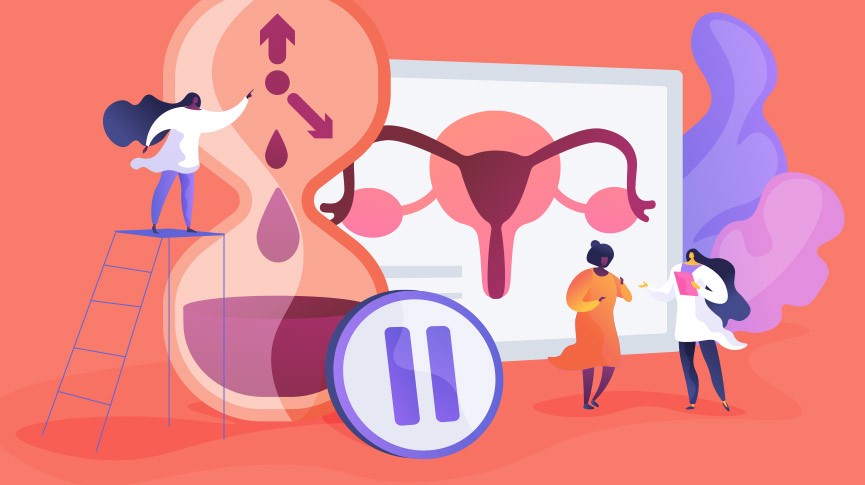


What Causes Menopause?
There can be several reasons for the onset of menopause. The most common of these is the natural age-related decrease in reproductive hormones. As individuals approach their late 30s, the ovaries begin to produce lesser amounts of estrogen and progesterone, the hormones that regulate menstruation, resulting in reduced fertility.
From the age of 40, until the average age of 51, changes such as shortening, lengthening, heavier, lighter or no menstrual periods can occur. This period is a process that continues until the ovaries stop producing eggs and do not enter the menstrual period.
A hysterectomy procedure in which an individual's uterus is removed but not their ovaries usually does not cause menopause immediately. Even if the individual no longer menstruates, their ovaries still release eggs, producing estrogen and progesterone. However, medical interventions of total hysterectomy and bilateral oophorectomy, in which both the uterus and ovaries are removed, cause immediate menopause. The individual's menstrual periods stop immediately. Since hormonal changes that would normally occur within a few years occur suddenly, hot flashes and other menopausal signs and symptoms are likely to be seen, which can be severe.
Cancer treatments, such as chemotherapy and radiation therapy, can both directly cause menopause and cause menopausal symptoms such as hot flashes during or immediately after treatment. The cessation of menstruation and fertility following chemotherapy is not permanent in almost every case, so it may still be necessary to take birth control measures.
Premature menopause or premature ovarian failure occurs in about 1 percent of women before age 40. Early menopause can occur when an individual's ovaries do not produce normal levels of reproductive hormones due to genetic factors or autoimmune diseases. However, in many cases, no cause can be found. In cases where this is seen, it is recommended to continue hormone therapy at least until the natural menopause age in order to maintain the health and structure of the brain, heart and bones.
What are the Complications that May Occur with Menopause?
After menopause, individuals are at increased risk of developing certain medical conditions. Among these medical conditions, primarily diseases of the heart and circulatory system, that is, cardiovascular diseases are seen. Lowering an individual's estrogen levels increases the risk of cardiovascular disease.
Heart diseases are among the leading causes of death in women as well as in men. Therefore, it is important to exercise regularly, eat healthy and maintain a normal weight. Individuals should consult a doctor to learn about steps to take to control high cholesterol or blood pressure.
Osteoporosis causes an individual's bones to become brittle and weak, resulting in an increased risk of fractures. Individuals lose bone density rapidly in the first few years after menopause and face a high risk of osteoporosis. In this process, women become particularly susceptible to fractures on the wrists, hips and spine.
As a result of the loss of elasticity of the vagina and urethra tissues of the individual, the possibility of frequent, sudden, strong urge to urinate and then involuntary urinary incontinence, i.e. urge incontinence, or loss of urine due to coughing, laughing or lifting weights, may increase the possibility of stress incontinence. The individual may face more frequent urinary tract infections.
Strengthening the pelvic floor muscles with kegel exercises and using topical vaginal estrogen can help relieve these symptoms of incontinence. In addition, hormone therapy to be continued under the control of a doctor can also be an effective treatment option for menopausal urinary tract and vaginal changes that may result in urinary incontinence.
Vaginal dryness caused by decreased moisture and loss of elasticity in the vagina can cause discomfort, injuries and light bleeding during sexual intercourse. In addition, decreased sensation can reduce the individual's libido, that is, the desire for sexual activity. In this case, water-based vaginal moisturizers and lubricants can help the individual. If vaginal lubricants do not provide sufficient results, local vaginal estrogen therapy in the form of vaginal cream, tablet or ring may give positive results, again after the doctor's advice.
During perimenopause and after menopause, individuals may gain weight as metabolism slows down. The individual may need to eat less and exercise more to maintain their current weight.

What Are the Symptoms of Menopause?
The signs and symptoms of menopause differ for every woman, including changes in menstrual patterns. In the months or years constituting the perimenopause process from regular reproduction and menstrual period to menopause, the individual firstly irregular menstrual periods, skin dryness, night sweats, slowed metabolism with weight gain, loss of breast fullness, sudden changes in mood, hair thinning, hot flashes, may show various signs and symptoms such as chills, sleep problems, and vaginal dryness.
During perimenopause, menstrual skipping is common and expected. Usually, periods skip a month and start again in the next period, or skip a few months and then start monthly cycles again for a few months.
Also, the menstrual period tends to occur in shorter cycles, so it may recur more frequently. However, it is possible for pregnancy to occur despite irregular periods. For this reason, it may be appropriate for individuals who skip a menstrual period, but are not sure that they have started the menopausal transition, to take a pregnancy test.
If bleeding is still observed in the vagina after the menopause process, a doctor should be consulted.
How Is Menopause Diagnosed?
Tests are not normally needed to diagnose menopause. The appearance of menopausal signs and symptoms is usually sufficient to diagnose the onset of the menopausal transition, that is, perimenopause. Individuals with concerns about irregular menstrual periods or hot flashes should contact their doctor. In some cases, further diagnosis may be necessary. In such cases, the doctor may recommend a blood test to check the levels of various hormones.
These tests include follicle stimulating hormone (FSH) and estrogen (estradiol) tests. As menopause occurs, an individual's FSH levels increase, while estradiol levels decrease. A thyroid-stimulating hormone test can be used to determine if an underactive thyroid, or hypothyroidism, is causing symptoms similar to those in menopause.

How to Treat Menopause
Menopause does not require any medical treatment. Instead, treatment for menopause focuses on relieving signs and symptoms that may bother the individual, and preventing or managing chronic conditions that can occur with aging.
Among the treatments to be used to manage the symptoms of menopause primarily include hormone therapy. Estrogen therapy is the most effective treatment option for relieving menopausal hot flashes. Depending on the individual's personal and family medical history, the doctor may recommend the lowest dose of estrogen for the shortest period of time necessary for symptom relief.
Individuals who have not had their womb removed will need progestin to maintain balance in addition to estrogen. Estrogen also helps prevent bone loss. Long-term use of hormone therapy may lead to some cardiovascular and breast cancer risks, but hormone use during menopause has provided significant benefits in some cases. In order to minimize the risks, such treatment should be applied after being recommended by the doctor.
It is possible to use vaginal estrogen to relieve vaginal dryness. In this treatment method, estrogen can be administered directly into the vagina using a vaginal cream, tablet or ring. This treatment releases a small amount of estrogen that is absorbed by the vaginal tissues and can help relieve vaginal dryness, sexual discomfort or some urinary symptoms.
Some antidepressants in a class of drugs called selective serotonin reuptake inhibitors, or SSRIs, can reduce hot flashes caused by menopause if used in low doses. In individuals who cannot take estrogen for other health conditions or who need antidepressants for any mood disorder, the use of a low-dose antidepressant with the advice of a doctor may be beneficial for the proper management of hot flashes.
Medications used for seizures under normal conditions have also been observed to help reduce hot flashes, and may benefit women who cannot use estrogen therapy or also individuals with nocturnal hot flashes. Medications typically used to treat high blood pressure can provide some relief from hot flashes.
Doctors may recommend a variety of medications to prevent or treat osteoporosis, depending on the needs of an individual's personal health condition. The use of vitamin D supplements to help strengthen bones, along with several medications that help reduce bone loss and fracture risk, may be possible after a doctor's recommendation.
Lifestyle Changes And Home Care For Menopause
Most of the signs and symptoms associated with menopause are temporary. It is possible to take several steps to help reduce or prevent the effects of these symptoms on the individual.
To relieve hot flashes, it's important to dress thin and layered rather than thickly, then being able to take off those multi-layered clothes when necessary. Drinking a cold glass of water or moving to a cooler location may help. For most women, triggers for hot flashes can include alcohol, spicy foods, caffeine, hot weather, hot drinks, stress, or even a hot room. Once you identify the trigger conditions, it can be important to avoid them.
It is possible to reduce vaginal discomfort by using over-the-counter, water-based vaginal lubricants, silicone-based lubricants, or a variety of moisturizers. Some individuals may be sensitive to various chemicals. In this case, it would be appropriate to choose products that do not contain glycerin, which may cause burning or irritation.
Staying sexually active increases blood flow to the vagina, preventing muscle relaxation and preventing involuntary leakage of urine. Kegel exercises, or pelvic floor muscle exercises, used to strengthen the pelvic muscles can also help improve some forms of urinary incontinence.
Avoiding items that make it difficult to sleep, such as caffeine and alcohol, can prevent sleep disruption. Even if not just before going to bed, exercising during the day will be beneficial both in terms of sleep health and to protect against heart disease, diabetes, osteoporosis and other conditions related to aging. Exercise methods such as yoga and pilates for this purpose can help minimize physical symptoms. Practicing relaxation techniques such as deep breathing, brisk breathing, guided visualizations, and massage can help with menopausal symptoms.

Eating a balanced diet, including a variety of fruits, vegetables and whole grains in the daily diet, limiting saturated fats, oils and sugars, and asking your doctor if you need calcium or vitamin D supplements to help meet daily requirements can be important to prevent the damage that menopause can cause in the body.
It is necessary to completely avoid smoking. Smoking increases the risk of heart disease, stroke, osteoporosis, cancer and many other health problems. In addition, it can cause both an increase in hot flashes and an earlier-than-normal menopause.
Among herbal remedies, some evidence has been observed that sage contains compounds with estrogen-like effects and can effectively manage menopausal symptoms, but this has not been more conclusively proven. However, people with allergies, pregnant or breastfeeding women, people with high blood pressure and epilepsy patients should avoid using various herbs and oils without the permission of the doctor. It should not be forgotten that currently used medical drugs may interact with various herbal treatment methods and lead to undesirable results.